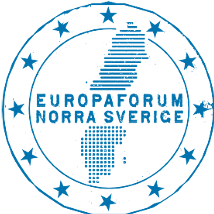Europaforum Northern Sweden (EFNS) is a network for politicians at the
local and regional levels from Norrbotten, Västerbotten, Jämtland Härjedalen and
Västernorrland. EFNS is a meeting place and knowledge arena where EU policies
are analysed and discussed in respects where it affects northern Sweden. EFNS
monitors European issues to influence EU legislation, EU strategies and action
programmes, and the EU budget. The purpose of EFNS is to safeguard the
interests of northern Sweden both in the European arena and in relation to national
level issues with a clear European perspective.
European Forum of Northern Sweden (EFNS) welcomes the ambition behind the
European Commission’s proposal for the regulation net-zero industry act (NZIA)
but has some comments on certain aspects of the proposal.
EFNS would like to present its perspectives on the proposal for the regulation on the
Net-zero Industry Act (NZIA).
Summary of EFNS positions:
• The European Commission should focus on reducing climate impact rather than
steering towards specific technologies. Technology neutrality is essential to promote
innovative development. The regulation’s limited list of net-zero technologies risks
excluding other technologies that are or may become vital for the green transition.
• Fast-tracking strategic projects may hold a risk, as it may hinder processes for other
types of business establishments that are also important for the green transition as
well as local and regional development.
• Developing faster and transparent permit processes for more efficient business
establishments is crucial, but they should allow member states, regions, and
municipalities to develop faster processes according to their own conditions and
resources.
• The proposal involves detailed regulations that pose a risk of surpassing national
self-determination and encroaching on the self-governance of Swedish
municipalities. It is important to protect the decision-making rights of the member
states, municipalities, and the regions. Local and regional engagement is necessary
to enhance societal acceptance in industrial establishment. NZIA should have a
territorial dimension that engages municipalities and regions, while considering
democratic anchoring and the Swedish municipal planning monopoly.
Permit Processes
EFNS welcomes the ambition to shortening the timeline for permit processes but holds that
how national permit processes should be set up is an issue that should be managed at the
national level. The focus should be on encouraging each member state to make general
adjustments to their processes, promoting predictability, transparency, and efficiency.
The permit processes for large industrial establishments can be complex and time consuming,
posing obstacles to their implementation. Therefore, it is encouraging that
efforts to strengthen EU value chains and enhance innovation capacity are addressing the
challenges associated with permit procedures for business establishments. The industry
plays a pivotal role in regional development, generating employment, tax revenues, and
overall attractiveness. Streamlining and expediting permit processes for such
establishments are of utmost importance.
Nevertheless, the proposed regulations risk going beyond national self-determination and
infringing upon the autonomy of Swedish municipalities. Safeguarding the decision-making
authority of member states and local authorities is crucial to ensure social acceptance of
industrial establishments. Rather than imposing detailed regulations, the EU should
provide platforms and networks for member states to exchange experiences and
knowledge. Moreover, considering economic and geopolitical interests, it is vital for the EU
to utilize its coordinating role in mapping and clarifying Europe’s reliance on foreign
ownership within net-zero technologies. These insights can help member states to strike a
balance between strategic autonomy and trade with third countries.
EFNS identifies potential risks in fast-tracking strategic projects, as it could impede the
processes for other types of business establishments that are also pivotal for the green
transition and local/regional development.
Technology Neutrality
To promote new developments, technology neutrality is essential. Enforcing legislation that
dictates which technologies or materials should be promoted, risks disadvantaging crucial
areas that can address climate challenges, potentially hindering new discoveries or
innovations.
Deviation from technology neutrality significantly limits the capacity for transition if
prevailing circumstances change. This can impede processes for other types of business
establishments, not just net-zero technologies, which are also important for the green
transition.
The regulation’s limited listing of net-zero technologies risks excluding technologies that
are or may become vital for the green transition. For example, there is room for increased
production and utilization of biomass-based technologies, which should continue to be part
of the solution for a fossil-free Europe and reduced carbon footprint.
EFNS holds that the European Commission should set requirements for reduced climate
impact – not steer towards specific technologies.
Local Anchoring for Industrial Establishments
Local and regional levels play a crucial role in achieving the goals of a climate-neutral
Europe. They can define local conditions, challenges, and opportunities necessary to attract
investments and increase the production of green technology throughout the value chain.
Therefore, EFNS emphasizes the need for NZIA to have a territorial dimension that involves
municipalities and regions and considers the planning monopolies of Swedish
municipalities.
The proposal regarding faster permit processes and greater national coordination through a
one-stop-shop for establishments risks reducing democratic anchoring at the local and
regional levels, which could contribute to increased polarisation. The NSPA emphasizes the
importance of involving the local community. The local community, indigenous peoples, and
valuable natural assets are aspects that must be respected and involved early in the
process. Fair and democratic establishment processes are crucial for achieving social
acceptance and require engagement from citizens, civil society, as well as local and
regional authorities. Moreover, there is a wealth of knowledge about local and regional
conditions accumulated within government agencies, organizations, and universities, which
should be fully utilized in the processing of permit applications.
A special consideration of each region’s context and objectives is the key to sustainable
development in all parts of the EU. Smart specialization and diversification are important
components in sparsely populated areas for increased competitiveness. It enables regions
to leverage relevant capacities and work efficiently, allowing research and entrepreneurship
to lead the way in the development of new ideas and products.
Industrial establishments play a vital role in the economy of affected regions but also
impose requirements on the areas in which they operate. For sustainable growth in the
industry, investments in community development and skills supply are also needed.
Find the position in PDF-format here
Adopted at the Europaforum Northern Sweden on June 25th.
Jonny Lundin (C)
Region Västernorrland
Mats Hellhoff (SD)
Region Västernorrland
Erik Lövgren (S)
Kommunförbundet
Västernorrland
Åsa Ågren Wikström (M)
Region Västerbotten
Rickard Carstedt (S)
Region Västerbotten
Ann Åström (S)
Region Västerbotten
Anders Ögren (S)
Region Norrbotten
Isak Utsi (S)
Norrbottens Kommuner
Ulrika Hammarström (S)
Norrbottens Kommuner
Jonas Andersson (S)
Kommunförbundet i
Jämtland Härjedalen
Elise Ryder Wikén (M)
Region Jämtland
Härjedalen
Daniel Danielsson (C)
Kommunförbundet i
Jämtland Härjedalen
Lars-Gunnar Nordlander (S)
Kommunförbundet i
Jämtland Härjedalen

